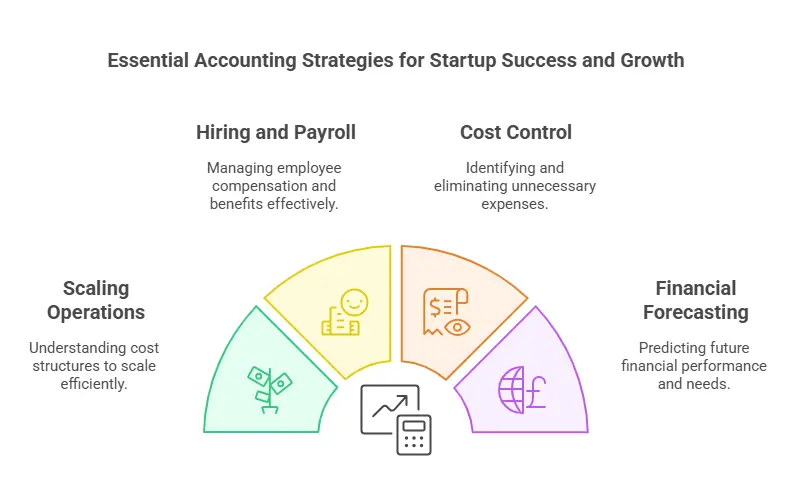Table of Contents
Starting a venture is an exciting time: it’s a whole bunch of energy, creativity, and ambition. Ah, but in all your hustle of getting a product to market, or your first customers, many start-ups forget something very important: Accounting. Accounting may not be as exciting as pitching investors, or having someone create your logo, but solid accounting could be the thing that keeps your startup alive and well. In this blog, we’ll explain what is startup accounting and it’s importance, and how it supports the growth of you and your business.
What is Startup Accounting?
Startup accounting refers to the act of documenting, observing, and assessing a limited liability company’s financial transactions. This can include everything from documenting revenue and expense transactions to producing financial statements and taxes.
In the early stages, startup accounting often involves limited financial resources, a rapidly changing business model, and fluctuating revenue streams. Startup accounting provides financial clarity and compliance during the hectic early stages of a company’s life. If you are bootstrapping a company or have capital from investors, ensuring the books are monitored is an important part of strategy.
Become an Accounting Pro – Learn from Industry Experts!
Why Accounting is Crucial for Startups?
1: Accounting provides information on
In the process of building a startup, it is often easy to get sidetracked by product development, marketing, and customers—anything but understanding your financial situation! You may have the next winning product. But without a clear understanding of your finances, even the best products can fall apart. Accounting provides the clarity and insight into your finances that lets you effectively manage your limited resources, avoid cash-flow problems, and better establish trust with investors and other stakeholders. In the simplest terms—good accounting can be the difference between a successful startup and failure!
Cash Flow Management : Usually, startups run on little money. A good accounting system helps you to clearly identify where money is coming from and going, therefore preventing overspending or cash running out.
Investor Confidence: Organized books demonstrate that you are serious, ready, and reliable; investors want to be able to clearly picture what is happening with their money. The decision-making process on funding your firm frequently revolves on well-organized books.
Tax Compliance: Fines can result from missing tax deadlines or underreporting revenue. An accounting system guarantees municipal, state, and federal tax law compliance.
Budget Planning: Accounting helps you establish and stick to a budget, so you can have a realistic view of what your startup can actually afford.
Measuring Performance: Accurate tracking enables you to measure growth, identify trends, and be strategic in making decisions based on actual numbers, as opposed to just guessing.
Placement Oriented PWC Business Accounting Course
PWC Certified Business Accounting Course by Entri App: Master in-demand skills, ace interviews, and secure top-tier jobs.
Join Now!The Role of Accounting in Startup Growth
As your business grows, so do your financial duties. Accounting is very important for:
- Scaling Operations: To scale smartly, you need to know how your costs work.
- Hiring and Payroll: Easily handle employee pay, taxes, and perks.
- Cost Control: Find costs that aren’t necessary and spend as little as possible.
- Financial forecasting: Guess how much money you will make, how much it will cost, and how much money you will need in the future.
It’s easy to get confused about success or run out of cash if you don’t have good accounting. These are two major reasons why startups fail.
How Accounting Helps Startups Make Informed Decisions
Every choice you make affects your finances, from hiring a new worker to starting a marketing effort. Accounting lets new businesses do:
- Several important financial reports like the income statement, balance sheet, and cash flow statement
- Break-even Analysis
- Margins of Profit
- Figure out the burn rate and runway
With these insights, leaders can use data to make decisions instead of just going with their gut. For some things, that can mean the difference between slowly growing and suddenly crashing.
Choosing the Right Accounting System for Your Startup
Choosing the right accounting setup depending on your firm’s size, complexity, and budget. Some of the options include:
1. DIY with Accounting Software
Products like QuickBooks, Xero, or Zoho Books suit startups at startup.
Good for individuals with basic accounting expertise.
2. Engage a Bookkeeper or Accountant
Supports day-to-day bookkeeping, tax filings, and regulatory compliance.
Meets startups with professional support without an in-house team.
3. Outsource to an Accounting Firm
- Offers full-service assistance and scalable solution.
- Typically utilized by venture-backed startups or those ready to scale rapidly.
Tip: Always make sure the method of preference is simple to offer financial reporting, scalability, and integration to other business applications.
Become an Accounting Pro – Learn from Industry Experts!
Placement Oriented PWC Business Accounting Course
PWC Certified Business Accounting Course by Entri App: Master in-demand skills, ace interviews, and secure top-tier jobs.
Join Now!Conclusion
Accounting isn’t just a backup task; it’s a strategy tool that can make or break a startup’s success. It keeps your finances in order, helps you make better decisions, and gives investors and other important people a good impression of you. Having access to correct financial information gives you a lot of power, whether you’re managing cash flow, making a budget, or getting ready to raise money. If you put accounting first from the start, you’ll not only keep your books in order, but you’ll also help your startup grow, be resilient, and be successful in the long run in a tough business world.
Placement Oriented PWC Business Accounting Course
PWC Certified Business Accounting Course by Entri App: Master in-demand skills, ace interviews, and secure top-tier jobs.
Join Now!Frequently Asked Questions
Can I do accounting myself as a founder?
Yes, with the help of accounting software. But as your startup grows, it’s best to bring in professionals to avoid costly mistakes.
What are the most important financial statements for a startup?
The Income Statement, Balance Sheet, and Cash Flow Statement are the top three that provide a snapshot of your startup’s health.
When should a startup hire an accountant?
As soon as your startup starts generating revenue or incurs regular expenses, it’s wise to bring in an accountant—at least part-time or as a consultant.
How often should I update my books?
Ideally, you should update your books weekly or at least monthly to ensure accuracy and keep up with financial trends.
Do I need accounting software if my startup is very small?
Yes, even small startups benefit from accounting software. It helps you stay organized, reduces errors, and makes tasks like invoicing, expense tracking, and tax preparation much easier.
What are common accounting mistakes startups make?
Some common mistakes include mixing personal and business finances, not tracking expenses regularly, failing to reconcile bank accounts, and not setting aside money for taxes.












